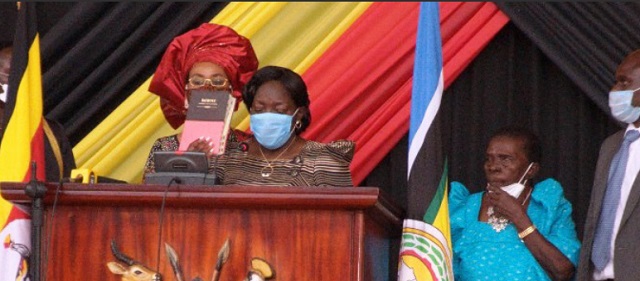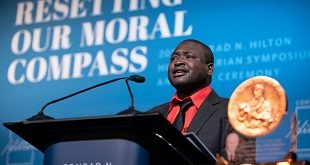
Poll shows majority of Ugandans don’t think legislators will work in their best interest
Kampala, Uganda | RONALD MUSOKE | Jacob Oulanyah, the outgoing Deputy Speaker of Parliament, was candid when he spoke to the press on May 20 shortly after swearing-in as the new MP for Omoro County. Oulanyah said public trust in Parliament has been eroded in recent years.
“Many debates, motions and laws have not been done in public interest. My honest assessment is that the next five years of Parliament should not be like the last five years. There are things that should change.” “This is the only Parliament where MPs, wherever they are seen, are jeered at,” Oulanyah said.
Many who listened to him may think this was a veiled attack on Rebecca Kadaga, his former boss, whom he is fiercely vying to defeat in the race for the Speakership seat in the 11th Parliament.
But Oulanyah was echoing what Ugandans actually think about their legislators. Even before the 527 MPs took their oaths to begin their work in the 11th Parliament, a recent poll conducted a month before the MPs’ swearing-in says majority of Ugandans do not think the legislators will work in their best interest.
The poll which was conducted amongst 17,028 respondents nationwide asked Ugandans if they believed their newly elected MP would work in their best interest.
The poll question ran on nine FM radio stations including; Radio Simba in Buganda, Baba FM in Busoga, Delta FM in Teso, Hits FM in Tooro, Hunter FM in Ankole, Radio Pacis in West Nile, Mega FM in Acholi, Radio Wa in Lango and Voice of Karamoja in the northeastern part of Uganda.
According to the polls results, 46% of the respondents believe that their MP would work in their best interest while 39% say they would not do so. Fifteen percent of the respondents said they did not even know who their MP was. The number of respondents who do not know who their MP is, is highest in Karamoja and Buganda (21%) followed by Tooro and Busoga (17%).
Ugandans in five out of the nine regions polled do not believe their newly elected MPs will work in their best interest. In Acholi, for instance, the figure is 53%, Busoga 47%, and West Nile 46%. Teso and Karamoja sub-regions follow with 43%. But people from Ankole (61%) followed by Lango (57%) and Buganda (48%) think their legislators will do exactly what they were sent to do in Parliament by the voters.
Mohles Kalule Segululigamba, the programme manager at TRACfm, a Kampala-based non-profit that is behind the polls under the Voices of Change campaign told The Independent that it is interesting to know that people who have just elected their legislators do not trust them. But he quickly suggests reasons as to why there are regional differences in trust of the MPs.
The Acholi sub-region voted this time in favour of President Yoweri Museveni and his ruling party, the National Resistance Movement. You would therefore think the region’s trust in the government and legislators has improved. But Segululigamba told The Independent that it is important to understand the context under which parliamentary elections were conducted in Acholi.
He says the elections in the sub-region were conducted under a cloud of intimidation while there were also unusual amounts of money poured into the campaigns. “The lack of trust in Acholi also speaks to the memory of the Lord’s Resistance Army, land issues and the general sense of injustice that still lingers on in the region,” he said.
“Even with all the poverty alleviation programmes that the government has taken to the sub-region such as NUSAF coupled with key Cabinet ministerial positions; Acholi still feels the government has not done much for the people there.”
In contrast, Segululigamba told The Independent that it may not be surprising that trust in the new legislators seems highest in the Ankole sub-region. He says Ankole has always had more constituencies with NRM-leaning legislators.
He adds that since President Yoweri Museveni tends to pick his ministers from the available pool of legislators in Parliament, there has always been a tendency for more ministers coming from the Ankole sub-region that are influential in directing government business and delivery of public goods.
Henry Muguzi, the executive director of the Alliance for Campaign Finance Monitoring (ACFIM), an NGO whose focus is on monitoring, documenting best practices and exposing flaws in financing of political parties and election campaigns in Uganda and across the continent told The Independent on May 20 that the discrepancy in expectation amongst Ugandan voters has to do with how the “national cake” has been shared over the years.
Muguzi said although there are some constituencies in Ankole like Igara East with poor road infrastructure, Ugandans in western Uganda are generally satisfied and have trust in government programmes.
On the other hand, people in Karamoja who have been voting overwhelmingly for the ruling party (the National Resistance Movement) think they have been deprived over the years. “The people in Karamoja have been voting for the (NRM) government for years but their fortunes have not changed,” Muguzi said.
Muguzi noted that ACFIM’s analysis of donations given by prospective MPs during the campaigns across the country is instructive. Whereas prospective MPs in western Uganda (Greater Ankole) tend to give tangible utilities such as ambulances, scholastic materials, and even go as far as constructing community roads, in most parts of eastern Uganda, Karamoja, Lango and Acholi sub-regions, the voters are given basic utilities such as food items, medicines and even school fees, meaning that the people there are deprived of basic needs.
“People in Ankole sub-region generally have trust in the government because they have not yet been in a situation where that trust is tested,” says Belinda Kyomuhendo, a programme officer at Action for Development (Acfode), a Kampala-based non-profit whose mission is to influence legislation and policy for gender equality in Uganda.
In contrast, Kyomuhendo says, people from eastern and northern Uganda have experienced varied crises, both natural and man-made, which have tested the government’s promises and ability to deliver.
“So they generally have a distrust of their representatives and I don’t think this last election changed much.”
“People in these sub-regions have had wars, famine, landslides and still have the highest poverty indicators in the country. They have been in a position where they expect the government and their legislators to deliver on their promises and they have not done so,” she told The Independent.
 The Independent Uganda: You get the Truth we Pay the Price
The Independent Uganda: You get the Truth we Pay the Price



